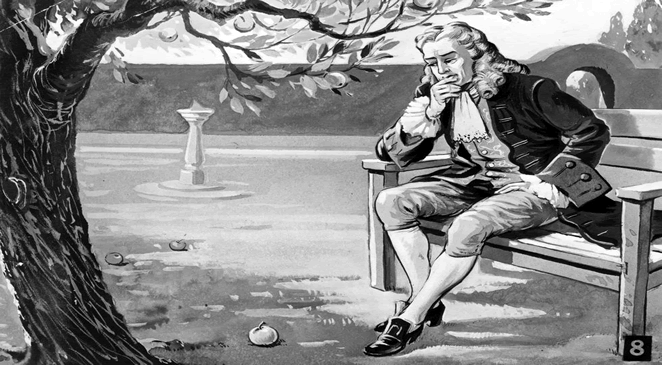
Isaac Newton: The Genius Who Redefined Our Universe
The Unravelling of the Cosmos: Newton's Laws of Motion 🌌
Isaac Newton wasn't just your average scientist; he was the heavyweight champion of the scientific revolution. With his three laws of motion, he laid the smackdown on chaos and introduced order to the universe. His first law, the law of inertia, tells us that an object at rest stays at rest, and an object in motion stays in motion, unless acted upon by an external force. Basically, it's the universe's way of saying, "If it ain't broke, don't fix it."
His second law, force equals mass times acceleration (F=ma), is the formula that rocket scientists use when they're sending stuff into space. It's all about the relationship between an object's mass, the force applied to it, and how fast it accelerates. This law is the bread and butter of physics and has more applications than a Swiss Army knife.
Newton's third law, for every action, there is an equal and opposite reaction, is why we can walk, swim, and fly. It's the cosmic give and take, the yin and yang of the physical world. Thanks to this law, we know that no matter what we do, the universe is always ready with a comeback.
Shedding Light on the Mysteries of Optics: Newton and the Spectrum 🌈
Newton's curiosity didn't stop with motion. He took a beam of light, passed it through a prism, and revealed that white light is actually made up of a spectrum of colours. This experiment was the equivalent of a mic drop in the 17th century. Newton showed us that colour is not a property of objects, but rather a result of light interacting with our eyes. This insight opened up a whole new world of understanding in the field of optics and laid the groundwork for modern physics.
The Alchemical Quest: Newton's Secret Passion 🔮
Behind the scenes, Isaac Newton was also deeply engrossed in alchemy. Yes, the man who rationalised the universe also thought he could turn lead into gold. Newton's alchemical pursuits might seem odd to us now, but they were all part of his quest to understand the natural world. His work in alchemy remained a closely guarded secret during his lifetime, largely because it was a bit too mystical for the mainstream science of his day. However, it's a fascinating reminder that even geniuses have their quirks.
The Mathematical Masterpiece: The Birth of Calculus 📚
Newton wasn't just about experiments; he was a mathematical virtuoso too. Alongside his rival, Gottfried Wilhelm Leibniz, Newton developed calculus. This wasn't just some new type of maths homework to torture students with; it was a revolutionary way of describing motion and change. Calculus gave us the tools to model everything from the orbits of planets to the flow of air over a wing. It's the language of the universe, allowing us to predict the future and understand the past.
The Principia Mathematica: Newton's Magnum Opus 📘
In 1687, Newton published the "Philosophiæ Naturalis Principia Mathematica," or Principia for short. This book is basically the Bible of physics. In it, Newton formulated the laws of motion and universal gravitation that he's famous for. The Principia laid down the foundations of classical mechanics and showed that the same physical laws apply to both celestial and terrestrial bodies. It was a unifying theory that proved the heavens and the Earth were not so different after all.
Newton's Legacy: The Giant on Whose Shoulders We Stand 🌟
Isaac Newton's impact on science and mathematics cannot be overstated. He transformed our understanding of the universe, laying the groundwork for centuries of discovery. Newton showed us that the universe is a place governed by laws, comprehensible and predictable. His work inspired generations of scientists and paved the way for the technological advancements that we take for granted today.
Newton's legacy is a testament to human curiosity and intellect. He was a man who sought to decode the universe, and in doing so, he showed us the power of the human mind. His famous quote, "If I have seen further, it is by standing on the shoulders of Giants," reminds us that knowledge is a collective endeavour, built upon the foundations laid by those who came before us.
As we continue to explore the cosmos, unravel the mysteries of quantum mechanics, and push the boundaries of technology, we do so following in the footsteps of Isaac Newton. His curiosity, rigor, and innovation set the stage for all scientific inquiry that followed. So, the next time you see an apple, remember the man who saw not just a fruit, but a key to understanding the universe. Here's to Isaac Newton, the man who taught us that with a bit of curiosity and a lot of hard work, the secrets of the universe are within our grasp. 🍏✨
This exploration into Isaac Newton's life and legacy highlights not just his monumental contributions to science but also the enduring impact of his work on our understanding of the world. Newton's story is one of brilliance, curiosity, and the relentless pursuit of knowledge, illustrating that the quest to understand our universe is a journey filled with endless possibilities.
